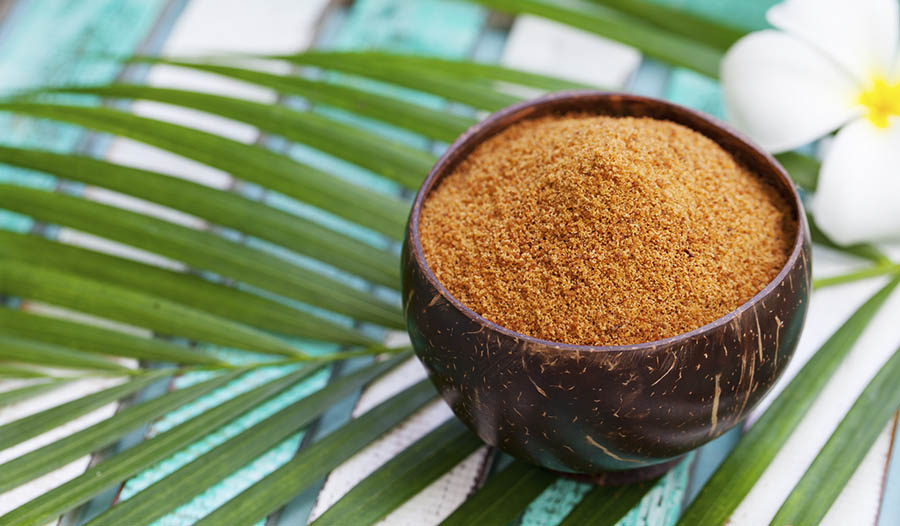Fordeler og ulemper med sukker og alternative søtningsmidler

Av Alysa Bajenaru, RD
Vi vet alle at for mye sukker er skadelig, men hvor mye er for mye? Og hva med alternative søtningsmidler? ?
Dette er de gjeldende anbefalingene for daglig tilsatt sukker:
- Barn 2-19: 6 teskjeer (100 kalorier)
- Voksne kvinner: 6 teskjeer (100 kalorier)
- Voksne menn: 9 teskjeer (150 kalorier)
De fleste amerikanere overskrider disse grensene, noe som øker risikoen for hjertesykdom og fedme. De viktigste kildene til tilsatt sukker i kostholdet er sukkersøtede drikker, kornbaserte desserter, fruktdrikker, meieridesserter og godteri. En viktig studie fra 2014 i Journal of the American Medical Association fant at risikoen for å dø av hjertesykdom øker ved regelmessig inntak av sukker og sukkersøtede drikker, uavhengig av vekt.
Vi vet at vi må kutte ned på sukkerforbruket, men hva med naturlige og alternative søtningsmidler? La oss gå nedover listen og snakke om fordeler og ulemper ved hver av dem.
Sukker
Fordeler: Sukker er en rask energikilde, ideell til baking.
Ulemper: Sterkt bearbeidet med få, om noen, næringsstoffer. I bunn og grunn "tomme kalorier" som kan føre til en blodsukkerstigning og en "krasj" kort tid etter.
Kokosnøtt sukker
Fordeler: Kokossukker er mindre bearbeidet enn bordsukker, og lages ved å koke inn nektaren fra kokosnøttplantens blomster. Den inneholder spor av mineraler og andre næringsstoffer.
Ulemper: Mineral- og næringsinnholdet er minimalt, og det inneholder like mange kalorier som bordsukker.
Erytritol
Fordeler: Erytritol er en sukkeralkohol som bare har 6 % av kaloriene til sukker, men som inneholder 70 % av sødmen. Det forårsaker ingen endring i blodsukkeret eller insulinnivået og kan kombineres med xylitol til baking.
Ulemper: Sukkeralkoholer fordøyes ikke av kroppen, og kan forårsake oppblåsthet og fordøyelsesproblemer når de gjærer i tykktarmen. Erytritol absorberes imidlertid for det meste i blodet før det når tykktarmen, noe som gjør det lettere å fordøye enn andre sukkeralkoholer. Det anbefales likevel at du introduserer erytritol i små mengder for å se hvordan du tåler det.
Stevia
Fordeler: Stevia utvinnes fra bladene på steviaplanten, er 200-350 ganger søtere enn bordsukker og har null kalorier.
Ulemper: Fordi det har en bitter ettersmak, kombineres Stevia ofte med andre søtningsmidler som erytritol, aspartam eller bordsukker. aspartam eller bordsukker.
Munkefrukt
Fordeler: Munkefrukt , også kjent som Lua Han Guo, utvinnes fra singe-frukten og er rundt 100-250 ganger søtere enn bordsukker, uten kalorier. Søtheten fra munkefrukten kommer fra unike antioksidanter som kalles mogrosider. Disse antioksidantene studeres for sine betennelsesdempende effekter og mulige kreft- og diabetesdempende egenskaper. (Det trengs mer forskning, men det er fint å vite at det kan være reelle helsefordeler med dette alternative søtningsmiddelet).
Ulemper: Noen mennesker liker ikke smaken.
Honning
Fordeler: Honning har antimikrobielle og antibakterielle egenskaper og er utmerket til å lindre sår hals. Det finnes over 300 ulike honningsorter, avhengig av hvor biene henter nektaren sin. Honning er mindre bearbeidet enn bordsukker og inneholder spor av vitaminer og mineraler.
Ulemper: Honning inneholder flere kalorier enn sukker, selv om det er søtere, så du kan ende opp med å bruke mindre. Honning bør aldri gis til barn under ett år fordi den kan inneholde bakterier som forårsaker spedbarnsbotulisme.
Agave
Fordeler : En populær vegansk erstatning for honning, agave nektar er laget av agaveplanten og inneholder spormengder av jern , kalsium , kalsium , kalium og magnesium . . Agave er halvannen gang søtere enn sukker og løser seg lettere opp i væsker enn honning.
Ulemper: Agavesukker inneholder halvannen gang mer kalorier enn bordsukker, og selv om det har en lavere glykemisk indeks, vil det likevel gi deg en blodsukkerstigning.
Bunnlinjen
Å kutte ned på tilsatt sukker er noe vi alle kan ha nytte av. Den gode nyheten er at det finnes noen gode naturlige alternativer å prøve. Og når alt annet mislykkes, spis en frukt!
ANSVARSFRASKRIVELSE:Velværesenteret har ikke til hensikt å gi diagnoser ...














































































